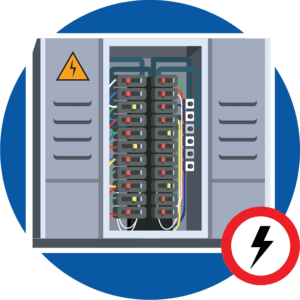The Importance of Electrical Safety
Electrical safety is a vital topic that affects everyone, whether at home or in the workplace. In today’s world, electricity has become an essential part of our daily lives, powering our homes and businesses. However, with its convenience also comes potential dangers if not handled correctly.
According to the National Fire Protection Association (NFPA), electrical fires account for over 51,000 home fires in the United States each year. This staggering statistic highlights the need to prioritize electrical safety and take necessary precautions to prevent accidents.
The purpose of this article is to provide an overview of electrical safety, its importance, and tips for ensuring it at home. By understanding the potential hazards and taking preventive measures, we can all play a part in keeping ourselves and our loved ones safe.
Understanding Electrical Safety
Electrical safety is a crucial aspect that should not be taken lightly. It involves the proper handling and maintenance of electrical systems to prevent accidents or injuries caused by electricity. In this section, we will discuss the definition of electrical safety and why it is essential to understand potential hazards related to electricity.
Definition of Electrical Safety
Electrical safety refers to the practice of avoiding electrical hazards and taking necessary precautions to prevent accidents or injuries caused by electricity. It involves understanding potential risks associated with working around electricity and following safety protocols to minimize them.
Importance of Understanding Electrical Hazards
It is crucial to understand the dangers of working around electricity as it can have severe consequences if not handled properly. Being aware of potential electrical hazards can help individuals take necessary precautions and prevent accidents from occurring.
Common Causes of Electrical Accidents
At Boulden Brothers, we take Electrical Safety very seriously and strive to educate our Newark, DE, community about the common causes of electrical accidents. Here’s a comprehensive list of what we often encounter and how we address these issues:
Power Outages Caused by Aging or Faulty Wiring: Aging or compromised wiring can lead to electrical outages, posing a significant risk. Our certified electricians are adept at addressing such issues, ensuring your home’s electrical system functions safely.
- Installation of Electrical Fixtures: Our electricians are skilled in installing various electrical fixtures, from light switches to ceiling fans and appliances, ensuring proper wiring and function.
- Upgrades for Outdated Wiring or Equipment: To minimize risks associated with outdated wiring and equipment, we recommend calling our qualified electricians for necessary upgrades.
- Installation for New Appliances & Outlets: As new appliances or devices may require more electricity than currently supplied, our electricians can install the necessary outlets and circuits.
- Maintaining Electrical Safety: Regular maintenance by experienced electricians is crucial for ensuring the proper functioning of outlets and preventing accidents due to faulty wiring or circuitry.
- Installing a Generator: Our electricians can reliably install generators or surge protectors to protect your home’s electrical system.
- Addressing Bad Electrical Connections: Issues like flickering lights often indicate poor connections in switches or circuit breaker boxes. We recommend immediate professional intervention for repairs.
- Responding to Electrical Hazards: Immediate action is necessary if you notice sparks from switches, burnt outlets, or fallen power lines.
- Plumbing Leaks: Plumbing leaks can affect electrical wiring and outlets, requiring an electrician’s expertise to prevent further damage.
- Electrical Humming Noises: If you hear humming noises from switches, it’s a sign that your wiring might be overheating and needs immediate attention.
- Preventing Electrical Fires: We stand ready to respond swiftly to electrical fires caused by faulty appliances, ensuring the safety of your home or business.
Additionally, it’s essential to be aware of other warning signs like regular power outages, tripping breakers, dim or flickering lights, loose plugs and sockets, damaged insulation on wiring, electric shocks or sparking, and unusual smells such as burning plastic. These signs indicate the need for a professional electrical inspection or repair.
Remember, Electrical Safety is paramount, and addressing these issues can prevent severe accidents and ensure a safe living or working environment. At Boulden Brothers, we guarantee reliable services and are committed to the safety and satisfaction of our customers in Newark, DE.
The Dangers of Electrical Accidents
Electrical accidents can happen at any time, often when we least expect it. These accidents can occur in the workplace or at home, and they have the potential to cause serious injuries or even death. According to the National Safety Council, electrocutions are one of the leading causes of workplace fatalities in the United States.
In addition to this, electrical fires account for nearly 10% of all home structure fires, resulting in hundreds of deaths and thousands of injuries every year. Electrical accidents can result from various causes, including faulty wiring, improper use or maintenance of electrical appliances, and coming into contact with power lines.
These accidents can lead to electric shock, burns, falls, and even explosions. It is crucial to understand the dangers associated with electricity to prevent such accidents from happening.
Types of Injuries Caused by Electricity
Electrical injuries can be broadly classified into two main categories: burns and shocks. Burns are the most common type of electrical injury, caused by direct contact with electricity or through arc flashes or blasts. These types of injuries occur when electricity passes through the body, causing damage to tissues and organs.
The extent of burn injuries depends on multiple factors such as voltage, duration of contact, and the pathway of the current through the body. Electrical burns can range from superficial skin burns to deep tissue damage that may require amputation.
In addition to burns, electrical shocks are also a major type of injury caused by electricity.
Shocks occur when an electric current passes through the body, affecting muscles and nerves. The severity of a shock depends on various factors such as the amount of current, duration of contact, and path through the body. While mild shocks may only cause discomfort or tingling sensations, severe shocks can lead to muscle spasms, paralysis, and even cardiac arrest.
In extreme cases, electrical shocks can be fatal. Electrical injuries can also result in other types of injuries such as falls and secondary trauma. When someone suffers an electrical shock, they may experience muscle contractions that can lead to falls from ladders, roofs, or other elevated surfaces.
In addition, the intense pain and disorientation caused by an electric shock can also contribute to secondary injuries such as broken bones or head trauma.
Potential Risks to Property and People
Apart from causing injuries, electricity also poses a significant risk to property and people. Faulty electrical systems or appliances can lead to fires, which can quickly spread and cause extensive damage to homes or buildings. Additionally, electrocution hazards are not limited to the individual in direct contact with electricity, as nearby individuals may also be at risk of shock or injury.
Tips for Ensuring Electrical Safety at Home
Electrical safety is a topic that should not be ignored, especially when it comes to our homes. According to the National Fire Protection Association, electrical fires account for an estimated $1.3 billion in property damage each year. These statistics emphasize the importance of understanding and practicing electrical safety measures at home.
Regular maintenance and inspection of electrical systems can go a long way in preventing potential hazards. This includes checking for frayed wires, and loose connections, and ensuring proper grounding of outlets. It is also important to hire certified electricians for any installations or repairs to ensure that they are done correctly and safely.
Proper use of electrical appliances and devices is another crucial aspect of electrical safety at home. This means following instructions for usage and not overloading outlets or extension cords. It is also important to keep electrical appliances away from water sources to avoid the risk of electrocution.
Recognizing warning signs of potential hazards is also essential in maintaining electrical safety at home. These may include flickering lights, burning smells, or buzzing sounds coming from outlets or appliances. If any of these warning signs are present, it is important to address them immediately by seeking professional help.
In addition to individual actions, government regulations also play a significant role in ensuring electrical safety. These regulations include specific standards and codes that must be followed during installations and repairs. Homeowners need to educate themselves on these regulations and comply with them to avoid potential hazards.
The Role of Government Regulations in Electrical Safety
While individuals need to take responsibility for their electrical safety, government regulations play a crucial role in ensuring overall safety standards are met. These regulations are put in place by regulatory bodies such as the National Electrical Code (NEC) and the Occupational Safety and Health Administration (OSHA). Here are some key aspects of government regulations related to electrical safety.
Overview of Electrical Safety Standards and Codes
The NEC is the most widely recognized standard for electrical safety in the United States. It sets guidelines for the safe installation, maintenance, and use of electrical systems. The code is regularly updated to keep up with advancements in technology and potential hazards.
Similarly, OSHA has established standards specifically for workplace safety, including electrical safety. These regulations are aimed at protecting employees from injuries and fatalities caused by electrical hazards.
Importance of Compliance with Regulations
Individuals and organizations need to comply with government regulations related to electrical safety. Failure to do so not only puts oneself at risk but also poses a danger to others who may come into contact with the electrical system or equipment. Non-compliance can also lead to legal consequences and fines.
In addition, complying with regulations helps maintain a safe and efficient environment. By following established guidelines, potential hazards can be avoided and the overall safety of individuals and property is ensured.
In conclusion, electrical safety is a crucial aspect of our daily lives that should not be taken for granted. Understanding the potential hazards and dangers posed by electricity is essential in ensuring the safety of ourselves and those around us.
By following simple tips such as regular maintenance and proper use of electrical devices, we can prevent accidents and protect our properties from potential damage. Additionally, it is crucial to comply with government regulations and seek the help of certified electricians for installations and repairs. Remember, electrical safety is a responsibility that we must all take seriously.
